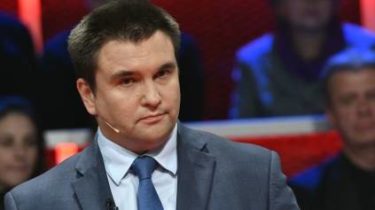The “law on education”: Klimkin at the meeting with Szijjártó said on political manipulati of the Russian Federation and Ukraine is ready for dialogue

The Minister of foreign Affairs of Ukraine Pavlo Klimkin in Hungary, stated that Ukraine is ready for constructive dialogue regarding the “linguistic norm” of the law on education, and noted that Russia for many years uses the language issue in their political manipulations.
This was announced by the speaker of the foreign Ministry of Ukraine Marian Betz on Twitter.
.@PavloKlimkin Mi otkrit to constructive dialogue. Spades,Nashi, Argumenti Buli pocut.We will keep discus about elementary law
— Mariana Betsa (@Mariana_Betsa) 12 Zhovtnya 2017 R.
Klimkin held with Siarto “Frank conversation based on arguments, not pronouncements on the basis of facts, not mythology”.
“The education act is not directed against any minority. Every countryman in addition to the native, have to master the state language”, – quoted Betz, the head of the foreign Ministry of Ukraine.
Klimkin said that Ukraine does not intend to close schools and fire teachers. And in order to remove the concern of the Hungarian colleagues, Ukraine has passed the law on education for examination to the Venice Commission.
.@PavloKlimkin Dwellers dodatkovo Studio sanaatana ugorskih co, mi passed the law on the sanitary and epidemiological Commission to Venezianische
— Mariana Betsa (@Mariana_Betsa) 12 Zhovtnya 2017 R.
“We are open to constructive dialogue. I hope that our arguments were heard. Will lead a discussion on the implementation of the law”, – said the Ukrainian Minister.
Otowa on the question of the role of the Russian Federation, Klimkin said: “Russia has for many years uses the language issue in their political manipulations.”
Foreign Minister of Ukraine also stressed that the Association Agreement between Ukraine and the European Union – a path of reform, which is important for all Ukrainian citizens, including those of Hungarian origin.
Recall, September 5 during a meeting of the Rada adopted the law of Ukraine “On education”, which introduced the 12-year secondary education. The language of instruction in educational institutions determined by the state. The document envisages that the institutions can be taught one or more courses in two or more languages – Kazakh, English and other official languages of the European Union. Persons who belong to indigenous peoples and national minorities of Ukraine is guaranteed the right to education in their native language along with the Ukrainian language in public institutions of preschool and General secondary education.
Romania and Hungary, criticized the adopted law on education, believing that it violates the rights of national minorities in Ukraine. Statements with respect to Ukrainian law by the Ministry of foreign Affairs of the two countries. The President of Moldova Igor Dodon hopes that Ukraine will reject the new education act because of the violation of the rights of national minorities. According to him, the new education Act will lead to the abolition of the system of education in the native language of the ethno-cultural minorities in Ukraine. Subsequently, in Russia, this law called “an act of forced Ukrainianization, which constituted a flagrant violation of Ukraine ratified the European Charter for regional or minority languages”. “The state Duma has prepared a statement regarding the Ukrainian law on education, in which he condemned adoption by the Verkhovna Rada of the document. The Russian foreign Ministry stressed that the document infringes on the interests of millions of Russian-speaking residents of Ukraine.
But the Council of Europe experts welcomed the law on education in Ukraine. On 28 September the Minister of foreign Affairs of Ukraine Pavlo Klimkin sent the education act for consideration of the Venice Commission.
Videobase may require Ukraine to change the law on education
TSN. 16:45
Yesterday, 17:28
12 October PACE held an emergency debate about the law and the results of the adopted resolution with recommendations for Ukraine. In particular, according to delegates, the law does not provide for the right of national minorities to study in their native language and significantly reduces their rights as concerned members of the Assembly. Moreover, it is noted that to obtain the conclusions of the Venice Commission “the Assembly considers it premature to take a position in relation to any legal issues.